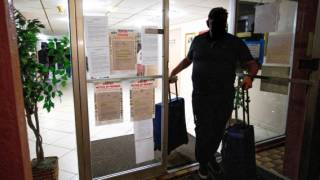In the aftermath of the Surfside tragedy, all assumptions regarding the utility and sufficiency of the legal rights, processes and safeguards for condominium unit owners have been upended. Florida is entering uncharted territory in which high-rise coastal condominium buildings continue to age under the watch of volunteer board members.
The recent tragedy has caused scrutiny into the 40-year certification process, and the structural integrity of older buildings, especially waterfront properties. Currently, there are numerous shortcomings in the re-certification process, which itself is only applicable in Miami-Dade and Broward counties. Many buildings don’t obtain their certification on time, with delays caused by infighting among board members and owners, including the politics relating to passing special assessments.
|
Residents from a 138-unit condo at 5050 NW Seventh St. in Flagami were forced to evacuate Aug. 9, 2021, after city officials deemed the building unsafe. |
Developers are looking
to bulk purchase older buildings, knock them down and put-up
new high-rises, given their locations, catering to the high
demand for waterfront luxury condominium units. The appetite
of developers seeking to find these older buildings to
demolish has only increased in the past 18 months due to the
influx of new Florida residents.
But what happens when a developer can’t get the requisite
owners’ vote in favor of terminating the condominium? In
that case, the developer, who may have acquired or tied up
many units, could elect people to the board who oppose
fixing up the building — because the worse off the financial
and/or physical condition of the building, the more likely
it is that a unit owner will simply sell to the developer.
When repairs cost too much
Owners in these older condominiums are in a Catch-22,
because they don’t want to fix the building and/or can’t
afford to, but they also can’t get the votes required of
unit owners to terminate the condominium. The older the
building, the more expensive the preventative maintenance
required to properly protect the building and/or to
remediate existing defects.
We need to figure out how to turn this situation around to
avoid these buildings becoming more dilapidated and
potentially dangerous. One potentially overlooked avenue of
relief is the ability to terminate a condominium on the
basis of economic waste. I suggest changes to the
Condominium Act to facilitate these terminations, where
appropriate, by capping (lowering) the percentage of
ownership votes required to terminate a condominium on this
basis, and to expand and clarify the criteria for economic
waste terminations.
Expanded economic waste termination powers can avoid a
standoff between those who want to stay in the building and
not sell, and those who want to sell. While a building
official can always close down the building and remove
residents, the better way to address this situation is to
make it economically viable for residents to sell and
terminate the condominium where well-documented looming
structural deficiencies require profound remediation that
the membership simply cannot afford.
Economic waste termination rights should also include an
expansion of procedures to ensure that residents get fair
market value and are not left with low-ball offers from a
potential redeveloper. What we cannot do is allow these
stalemates to linger, and allow the buildings to become or
remain unsafe, with residents living in danger. That serves
nobody’s interests.
To some, the concept of forced sale is un-American. But
nobody can dispute that the current state of affairs with
older buildings simply cannot continue. It’s clear to all
Floridians that the laws must change, and they must change
in many different areas of the law to prevent more unsafe
structures from further deterioration.
